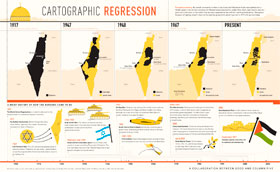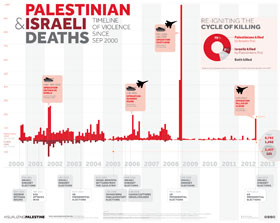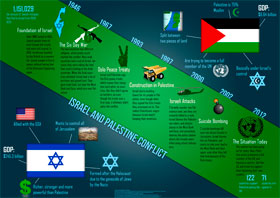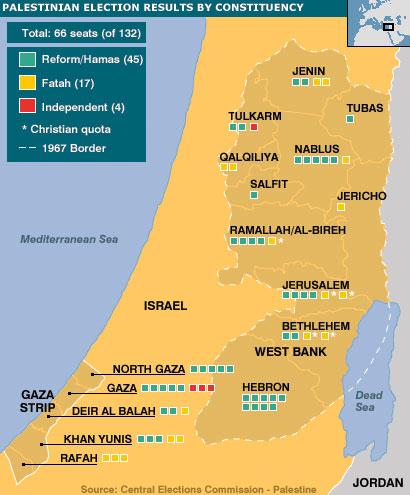The Israeli-Palestinian Conflict: Wasted Breath or a Gleam of Hope?
John Kerry, Mahmoud Abbas, Shimon Peres,
World Economic Forum on the Middle East
and North Africa, 26 May 2013
In
Login if you are already registered
(no votes) |
(0 votes) |
The U.S. under Obama’s second term intensified its shuttle diplomacy efforts to revive peace talks between the Israelis and the Palestinians that broke down 3 years ago. But will John Kerry’s economic plan for Palestine and recent improvements in Fatah-Hamas dialogue on a unity government lead to any progress in the peace process between Israel and Palestine? Or it will continue to be just talks about talks? Dr. Christopher Vasillopulos and Dr. Mark Heller, experts on Middle Eastern political and strategic issues, share their insights on the future of the Israeli-Palestinian conflict.
The U.S. under Obama’s second term intensified its shuttle diplomacy efforts to revive peace talks between the Israelis and the Palestinians that broke down 3 years ago.
But will John Kerry’s economic plan for Palestine and recent improvements in Fatah-Hamas dialogue on a unity government lead to any progress in the peace process between Israel and Palestine? Or it will continue to be just talks about talks?
Dr. Christopher Vasillopulos and Dr. Mark Heller, experts on Middle Eastern political and strategic issues, share their insights on the future of the Israeli-Palestinian conflict.
Interviewer: Maria Prosviryakova, Russian International Affairs Council
 | Christopher VasillopulosProfessor of Political Science, Eastern Connecticut State University The U.S., although it says differently, its behavior has supported Israel almost reflexively |  | Mark HellerPrincipal Research Associate at the Institute for National Security Studies, Tel Aviv University |

Christopher Vasillopulos: The U.S., although it says differently, its behavior has supported Israel almost reflexively
Christopher Vasillopulos, Professor of Political Science, Eastern Connecticut State University; author of a number of publications on the Middle East issues.
John Kerry, U.S. Secretary of State, at the World Economic Forum in May announced plans for a US$ 4 billion economic program designed to improve the Palestinian economy and provide the basis for sustainable peace. Will this plan achieve its ends? What obstacles is this plan likely to face?
All the money that the Palestinians can get is obviously very welcome, but I don’t think that it is going to change the behavior of Israel or the United States beyond that. I am very pessimistic about anything happening in any peace talks or any negotiations because I just don’t believe that any Israeli government since 1967 has been in favor of peace if it means a viable Palestinian State. Moreover, the U.S., although it says differently, its behavior has supported Israel almost reflexively. So, I am very pessimistic about any changes.
Will Palestine be able to agree to make some concessions in exchange for economic benefits?
I do not think that Palestinians can make any concessions. What concessions can they make than others that they already made?
The lack of any unified Palestinian government prevented any meaningful dialogue between the Palestinians and the Israelis. Reconciliation between Fatah and Hamas is also seen by many as an important prerequisite for securing peace between Israel and Palestine. Recently the rival factions again announced that they have set a three-month timetable to form a unity government and hold elections. What are the prospects of this agreement?
It is good if they have a unified government. But it is good for the Palestinians, so that they are not fighting with each other as much and so that they can present a united front to the rest of the world. I also think it is useful to people who are trying to be neutral on this issue to be able to deal with one Palestinian voice. But from the Israeli point of view having Hamas “legitimated” into the government is going to be another talking point against dealing with the Palestinians because by their definition Hamas is the terrorist organization.
It will be difficult to find a real agreement between Hamas and Fatah because of the resistance on the part of Fatah. They will say that this will make Israel even more intransigent. And why should Hamas agree with Fatah if the whole idea is “accommodation to Israel on Israeli terms”? I just do not think it is reasonable. A compromise between Fatah and Hamas is necessary and maybe possible but not if it means accepting Israeli terms - preliminary terms for any negotiations. That is simply not going to work. If I were Hamas I would not agree to it.
Many experts believe that the final peace settlement between Israelis and Palestinians will mean trading land for peace to form a two-state solution. How do you see the peace formula?
Everybody agrees to that, even the Netanyahu government. The problem is what land and what is the definition of peace. If you mean going back to 1967 borders which everyone thinks is the minimal territory for a viable Palestinian state. And if you mean that Gaza and the West Bank are going to be contiguous – that is no Israeli land between them – then you might be talking but you still have the problem with all the illegal settlements, the military roads and the wall and these are insuperable obstacles to having a sovereign Palestinian state.
Palestine will be left if Israel accepts 1967 borders with less than half of what the UN mandate was in 1948. That is a bare minimum from my point of view. And there are many-many other issues – right of return, compensation etc. It seems to me insuperable.
Some experts on the Middle East believe that new democratic and/or Islamist governments in the Arab World can become much more supportive of the Palestinians than previous regimes. What do you think about the impact that the Arab Spring and on-going crisis in Syria might have on the Israeli-Palestinian conflict?
It depends on how the Arab Spring is viewed. If it is viewed as a liberation of Arab masses who are intensely anti-Israeli and anti-American at least on the Palestine issue - then it is going to complicate the situation because it will strengthen Israel’s hand and America’s hand in terms of resisting any kind of accommodation with organizations like Hamas and the Muslim Brotherhood.
We should remember that the Americans didn’t support any element of the Arab Spring until they were presented with the fait accompli. America prefers to work with dictators including Mubarak; for 30 years it supported Mubarak. And Hillary Clinton 2 days before he left was still talking about Mubarak as being part of the negotiations. Unless America changes its policies towards Israel and towards the Arab world in total it is going nowhere.
Another issue that almost never gets brought up these days is Israeli nuclear weapons. Israel pictures itself as poor little David against the Goliath of the Arabs. As long as they have the nuclear weapons they are the strongest power in the entire region including Turkey. Unless somebody figures out a way to neutralize Israeli weapons – Israeli will have a totally free hand militarily in the region. And the U.S. rearms resupplies and cancels its debts every time Israel has a military attack. That is not the ground work for any kind of peace. And it makes America seem very hypocritical as it continues to claim that it is an honest broker in the region. The honest broker that can’t accept the reality that everybody else knows that Israel has al least 200 or 400 nuclear arms missiles. The hypocrisy just reeks and I do not know how it changes.
The Israeli-Palestinian conflict is a problem that no president since Nixon has managed to make progress on. Nevertheless, the conventional wisdom has it that in the United States second-term presidents tend to be bolder in their initiatives. Will Obama be able to make any progress on Israeli-Palestinian issues?
When I was a graduate student over 30 year ago, there was a joke that said “the situation in Palestine is the same - it is continuing to deteriorate and that was 30 years ago.” Since 1967 things have gotten worse.
The bottom line is that there is no reason for Israel to change their policies they are winning and they are making life miserable for about 5 million Palestinians. They control Palestine’s electricity, they control their water, all their garbage collection, their employment. Why should they change? And every day the settlements get larger, everyday facts on the ground are in favor of Israel. And most of the Arab world abhors this, but as long as the U.S. continues to support it, Israel is going to continue to do what they were doing. If I were the Israelis I wouldn’t be in favor of peace talks either. I would be in favor of talks, but not in favor of a viable Palestinian state. No one wants a strong neighbor. So, why should Israel agree to have a viable Palestinian state if they can avoid it? It doesn’t make any sense.

Mark Heller: I believe that the United States, or at least Obama in this term, has made the decision to give it one last serious try
Mark Heller, Principal Research Associate at the Institute for National Security Studies, Tel Aviv University; author of a number of publications on Middle Eastern political and strategic issues.
John Kerry, U.S. Secretary of State, at the World Economic Forum in May announced plans for a US$ 4 billion economic program designed to improve the Palestinian economy and provide the basis for sustainable peace. Will this plan achieve its ends? What obstacles is this plan likely to face?
I think the major obstacle it is likely to face is the fact that there is no necessary connection between economic assistance to the Palestinian Authority and readiness to enter negotiations, much less proceed on a constructive course.
Will Palestine be able to agree to make some concessions in exchange for economic benefits?
The Palestinian Authority will be very happy to receive any economic assistance it can but its leaders won’t necessarily agree to give up their preconditions and intermediately enter negotiations.
There is not any historical record of political concessions being given in return for economic support. That kind of budget support for the Palestinian Authority has been provided on more than one occasion in order to sustain the viability of the Palestinian Authority, to reduce the probability of the outbreak of violence, and to improve the political prospects of the Palestinian Authority – which is controlled by Fatah -- versus Hamas. But the economic assistance has never been made conditional on any kind of political concessions.
The lack of any unified Palestinian government prevented any meaningful dialogue between the Palestinians and the Israelis. Reconciliation between Fatah and Hamas is also seen by many as an important prerequisite for securing peace between Israel and Palestine. Recently the rival factions again announced that they have set a three-month timetable to form a unity government and hold elections. What are the prospects of this agreement?
Again, based on historical experience, we should not be more than cautiously optimistic about the chances of this taking place. Fatah and Hamas have been having this discussion about reconciliation on and off for over 10 years. And there have been countless announcements of procedural agreements, agreements to move ahead on a particular course either of the substance of reconciliation or at least of the ways to pursue reconciliation. None of them has ever come to fruition. In order to expect a different outcome one would have to be able to identify new factors and I don’t see any new factors that are on the horizon right now. I would be surprised if this initiative bears more fruit than have any half a dozen or more initiatives in the past.
The second point to be made is that there may be exaggerated expectations about the positive impact of the Fatah–Hamas reconciliation for productive peace negotiations. It is true that in order to be able to make some kind of political commitment you need an authoritative interlocutor, and without their reconciliation there is no authoritative interlocutor. But that still begs the question what the basis for this reconciliation would be, especially its political content. There are enough difficulties reaching any kind of agreement between Israel and Fatah. If reconciliation means anything other than capitulation by Hamas - which seems highly unlikely – it can therefore only happen if there is some kind of meeting in the middle ground between Fatah and Hamas. And this would only make the prospects for Israeli-Palestinian agreement more remote.
Many experts believe that the final peace settlement between Israelis and Palestinians will mean trading land for peace to form a two-state solution. How do you see the peace formula?
We are speaking about a hypothetical possibility, and, yes, there is a widespread agreement that this formula forms the conceptual basis for any possible peace deal. But simply posing that as a principle doesn’t tell us very much either about the content of a peace agreement or about the extent of the land that is being conceded by Israel; nor does it address any of the other major issues that are on the agenda between the Israelis and the Palestinians.
This land for peace formula was adopted after the war in 1967 when the antagonists in the conflict were Israel and a number of Arab states, none of which had the same historical baggage that the far lengthier conflict between Jews and Palestinian Arabs had. Therefore, one might have reasonably said: “Look, the main issue between Israel and states like Egypt or Syria was the question of land”. And land could have formed a basis for a comprehensive package. But there are a lot of other issues with the Palestinians that are not at all addressed by a question of land for peace: question of refugees, historical guilt and narratives, Jerusalem, mutual recognition. If it were that simple it could have been resolved a long time ago.
Some experts on the Middle East believe that new democratic and/or Islamist governments in the Arab World can become much more supportive of the Palestinians than previous regimes. What do you think about the impact that the Arab Spring and on-going crisis in Syria might have on the Israeli-Palestinian conflict?
Basically, it introduces a whole new element of uncertainty into the region. It also introduces more immediate and in many cases graver strategic concerns which serve as a kind of distraction. I think the general reaction in Israel is that it made people a little bit more cautious about the willingness to make far-reaching concessions in conditions of such uncertainty.
The Israeli-Palestinian conflict is a problem that no president since Nixon has managed to make progress on. Nevertheless, the conventional wisdom has it that in the United States second-term presidents tend to be bolder in their initiatives. Will Obama be able to make any progress on Israeli-Palestinian issues?
I think we can say three things about the American involvement in this issue, as in many other issues.
The first is that to the extent to which anybody in the international community can take a leading role, it is the United States, particularly in this part of the world on these issues.
Secondly, the United States’ capacity to influence events has been exaggerated by the parties themselves and by the outside parties. It is not simply a question of American presidents in the second term. Yes, the conventional wisdom has it that people think he is free of domestic political constraints and therefore able to be more flexible. But there are a number of important points to be born in mind. The American president certainly dominates American foreign- and defense policy-making, but he is not a dictator. He still needs to operate within a broader political system which includes Congress, the media and public opinion, even his own party, which -- unlike him – is thinking about the next elections.
Thirdly, even when the United States is clear and determined to act in a certain way, it can not necessarily impose its will without any conditions on the parties directly involved. I believe that the United States, or at least Obama in this term (judging by the behavior of Kerry), has made the decision to give it one last serious try. And if it doesn’t bear fruit - and that depends much more on the Israelis and the Palestinians than it does on the Americans - then even Obama will understand that there are limits beyond which even he cannot push.
(no votes) |
(0 votes) |








